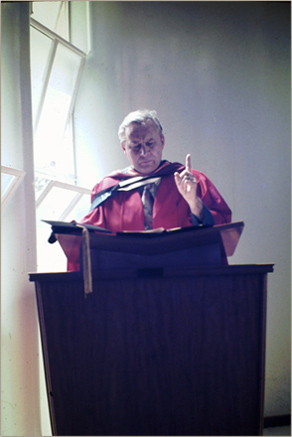Job 7:7-14
‘O, remember that my life is wind (– but a breath)! My eye shall see good no more !…. See me, no more!…. I am not!…. The cloud is consumed, and vanishes away. So is he who goes down to the grave…. He shall return no more to his house; neither shall his place know him any more…. I will speak in the anguish of my spirit. I will complain in the bitterness of my soul…. When I say: “My bed shall comfort me; my couch shall ease my complaint” — then You scare me with nightmares, and terrify me through visions!’ Job 7:7-14.
In his Tracts and Treatises III:488, Calvin remarks: “In these words Job, deploring his calamity before God, exaggerated…that no hope of escape is mentioned. He only saw his calamities, which were pursuing him to the grave. Then it occurred to him that a miserable death would be the termination of a calamitous life. For he who feels the hand of God opposed to him, cannot think otherwise. From this amplification, he excited commiseration — and lamented his case before God.”
This feeling of the hopeless brevity of life, was overwhelming. Job turned in supplication to God — beseeching Him, the Everlasting, to think how swiftly his mortal life was passing.
We see good only in the present life — ending with death. By ‘my eye shall see good no more,’ Job meant his happiness or prosperity. Then, the state of the dead — though not extinction — was not to be called life. It was but a dreary shadow of life, having no contact with the living.
By ‘I am not!’ — Job meant God would look for him, enquiring after the work of His hands. But Job would be gone.
By ‘he who goes down to the grave’ or shee‘ool, is meant the place of departed persons. It is the appointed and inexorable demanding of everything earthly, and a place of shadowy duration.
shee‘ool is not to be confounded with one’s own tombstone. It means the area where the good and the wicked are consciously segregated from one another, till Judgment Day. Luke 16:22-26.
Job heaps image upon image, to set before himself and the eye of God the brevity of human life. He mentions: the weaver’s shuttle (v. 6); the wind (v. 7); the morning cloud (v. 9); and ends with a pathetic reference to his home, which would see him no more (v. 10). His impatience of the iron restraints of human existence, hurry him forward.
When I say: “My bed shall comfort me; my couch shall ease my complaint” — then You scare me with nightmares, and terrify me through visions!’ When he looks for sleep, instead of finding it, he is scared with nightmares, and terrified through visions.
Elephantiasis! Such distressing nightmares and terrors in sleep, are one of its symptoms. Job desired death. He wished his difficulty of breathing would suffocate him — its usual end. That is why he says: “O, remember that my life is wind — or but a breath!”

